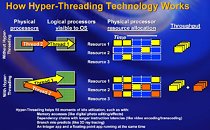Monday, June 26th 2017

Critical Flaw in HyperThreading Discovered in "Skylake" and "Kaby Lake" CPUs
A critical flaw was discovered in the way Intel implemented its simultaneous multi-threading technology, HyperThreading, on "Skylake" and "Kaby Lake" processors. Being a micro-architecture specific flaw, this could affect all implementations, from low-power mobile chips, to mainstream desktop, high-end desktop, and perhaps even enterprise-segment Xeon processors. At this time, there are no security implications of this flaw.
Intel chronicled this flaw in its micro-architecture errata "SKZ7/SKW144/SKL150/SKX150/SKZ7/KBL095/KBW095," and described it as follows: "Under complex micro-architectural conditions, short loops of less than 64 instructions that use AH, BH, CH or DH registers as well as their corresponding wider register (e.g. RAX, EAX or AX for AH) may cause unpredictable system behavior. This can only happen when both logical processors on the same physical processor are active." As an implication, Intel goes on to note that Due to this erratum, the system may experience unpredictable system behavior."The HyperThreading flaw can be fixed through a micro-code update distributed as a UEFI firmware update. Typically, it becomes the responsibility of DIY PC motherboard, pre-built desktop, and notebook manufacturers, to distribute the update. The issue first came to light in a Debian Linux user mailing-list, although it affects all PC operating systems, not just Linux. Support groups of Debian recommend disabling HyperThreading in the UEFI setup programs of your computers as a temporary workaround, till the micro-code patch is applied. Disabling HyperThreading will reduce performance in multi-threaded apps.
Source:
Debian Mailing List
Intel chronicled this flaw in its micro-architecture errata "SKZ7/SKW144/SKL150/SKX150/SKZ7/KBL095/KBW095," and described it as follows: "Under complex micro-architectural conditions, short loops of less than 64 instructions that use AH, BH, CH or DH registers as well as their corresponding wider register (e.g. RAX, EAX or AX for AH) may cause unpredictable system behavior. This can only happen when both logical processors on the same physical processor are active." As an implication, Intel goes on to note that Due to this erratum, the system may experience unpredictable system behavior."The HyperThreading flaw can be fixed through a micro-code update distributed as a UEFI firmware update. Typically, it becomes the responsibility of DIY PC motherboard, pre-built desktop, and notebook manufacturers, to distribute the update. The issue first came to light in a Debian Linux user mailing-list, although it affects all PC operating systems, not just Linux. Support groups of Debian recommend disabling HyperThreading in the UEFI setup programs of your computers as a temporary workaround, till the micro-code patch is applied. Disabling HyperThreading will reduce performance in multi-threaded apps.

98 Comments on Critical Flaw in HyperThreading Discovered in "Skylake" and "Kaby Lake" CPUs
Not worried about this at all.
Most OEM PC's are designed to be solid, long lasting machines which soldier on for years without maintenance. My work PC is an ancient 10 year old bitch of a Dell that won't die, something I pray for daily, since it is the only way I can get something newer.
1) Not all "enthusiast" or "power users" are into building PCs.
2) Not all of them have time to do this.
3) And some like building their PC and even have time, but simply want e.g. OEM's form factor (they tend to be smaller thanks to custom mobos) or service (Next Business Day or Onsite Service).
This is not the first discussion when you're going on about this "enthusiast build their PCs". Aren't you getting a bit bored by now?
Does an astronomer have to build his telescope? Does a cyclist have to assemble and service his bicycle?
Also, think about just how unjust you are to the whole computing idea. Is "being a computer enthusiast" really about building a PC and running benchmarks?That's even worse. Being a fanboy of a particular company but having to buy products from competitors, because one's favourites are temporarily behind in technology! Imagine the stress, the frustration building up over the years of using products you hate!
I have it mostly as gaming platform and rest is just graphics and rendering, thus tasks that do benefit from multi-cores very nicely. As for gaming, yea there is benefit in very high speed of 2 cores, but Ryzen isnt that bad actually. Very few games is actually CPU demanding.
Price to performance comparisons are only good for so long in such a volatile market, and AMD's recent releases have lit a fire under Intel's ass.
Their resting on laurels has been pissing people off for a long time.
Now that we have real competition again we have to wait for it to play out a little and then look at what is fairly priced and high performing.
It's all good for the consumer.
This doomsday stuff is nonsense.
If you are not affected by this: good for you, move along now, nothing to see here. And please, show some respect for people putting their time into opensource projects. We all benefit from them ...
Plus, the bug is so "serious" it went undetected for an entire generation of CPUs.